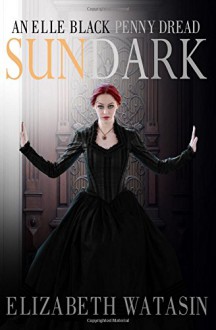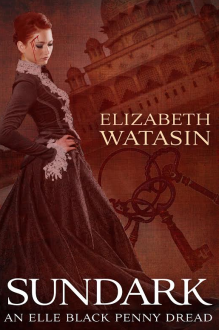
Elle Black lives a happily domestic life with her wife in the darkly gothic world of Victorian London; certainly an unconventional relationship but one she lives with pride and joy and love.
But Elle isn’t just a housewife – she’s a psychic and she considers it her duty to help those that Prince Albert’s Royal Commission cannot or will not handle – and when Josephine Durfish comes to her door with tales of Sundark, the haunted hotel in which guests have gone missing, Elle is spurred into action.
This book is set in the same world as the Dark Victorian series – and it has those same wonderful elements. We have the darkly Gothic Victoriana (which, I admit, I love so completely) with it’s beautiful style and aesthetic. And it’s not just conveyed by the description but the joyfully elaborate style of the writing. This is from me, someone who doesn’t like over-elaborate writing and find Dickens to be incredibly torturous – yet this elaborate joyful language is so evocative of style and location. Just reading the style of the writing, the way people talk to each other, the setting it’s all so gloriously Victorian. The writing is beautiful and it oozes style and setting, it’s perfect.
I also love Faedra and Elle’s relationship. They’re married (using legal contracts) and are proud and passionate about their marriage. Their love and passion for each other is never hidden and it’s wonderfully omnipresent. Even though Elle spends most of this book separated from Faedra, her wife is always on her mind and their love permeates the entire book. It’s a beautiful relationship
And it’s not just a beautiful relationship because of their love, but because of how these characters are portrayed. I often feel how the book wonderful touches on a lot of stereotypes of lesbians and bisexual women, but never ever makes that a reason for the character – Faedra goes out and earns money while Elle stays home and prefers to keep house and be domestic, they even refer briefly to the idea of Faedra being a “husband” (because of the stereotype, especially in the age, of the man being the one to earn money) but reject it because they think they’re imposing a power imbalance on their relationship. And even when they do that, they then turn round and make Elle the active character throughout the book and Faedra be the one who loves bright colours and beautiful clothes. These are traits of the characters, not tropes they embody it’s that well balanced and it works for them. I love these characters.
I do feel that Elle’s open pride in her relationship faces a dubious lack of reaction from everyone around her, but it could as much be the setting; guests in a hotel and everyone being properly polite to each other.
With this beautiful relationship and wonderful world we have a twisty plot with lots of investigation of creepy paranormal events in this haunted hotel. The setting of this hotel is beautiful and creepy and with an odd cast of characters (some of which really worked and some of them just seemed… a little random and ill-defined).
Read More


 Log in with Facebook
Log in with Facebook 







